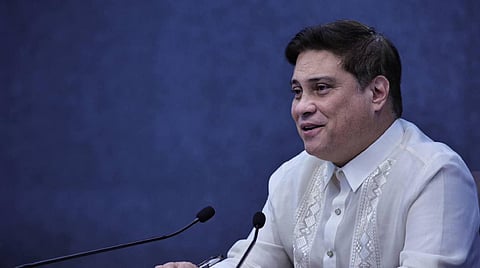
- NEWS
- the EDIT
- COMMENTARY
- BUSINESS
- LIFE
- SHOW
- ACTION
- GLOBAL GOALS
- SNAPS
- DYARYO TIRADA
- MORE

Senator Juan Miguel "Migz" Zubiri on Thursday sounded the alarm on the recently announced Philippine-United States tariff agreement, questioning whether the country truly benefited from the deal amid rising concerns from local exporters and industry stakeholders.
During the Senate Committee on Economic Affairs hearing on the Philippines-U.S. tariff, Zubiri expressed frustration over the lack of transparency from the Executive branch and raised serious concerns about the potential impact of the new tariff structure on Philippine industries.
“We have called this hearing because there is an urgent need for us to be informed of, and be prepared for, the impact of the tariffs on our industries,” Zubiri said.
According to Zubiri, under the terms announced by U.S. President Donald Trump, Philippine exports to the U.S. will be subject to a 19 percent tariff, while U.S. exports to the Philippines will be tariff-free.
This is just a one percent reduction from the previously proposed 20 percent rate on Philippine goods announced on 9 July 2025, he noted.
But Zubiri questioned whether this slight concession could be seen as a win for the country, especially given President Ferdinand Marcos Jr.'s highly publicized trip to Washington to secure the deal.
“So the question is, did we really gain anything? Or lugi pa ba tayo, as what critics are saying, considering how President Marcos even hurriedly went to the U.S. for this deal?" Zubiri asked.
He pointed out that other countries in the region, some of which did not send high-level delegations to Washington, appeared to have secured more favorable terms:
Cambodia: From 36% to 19% (17-point decrease)
Indonesia: From 32% to 19% (13-point decrease)
Vietnam: From 46% to 20% (26-point decrease)
Japan and South Korea: Both lowered tariffs from 25% to 15%, and imposed reciprocal tariffs on U.S. goods
China: From 145% to 30%
“Those are just some of the tariff rates bargained by other countries in comparison to what we got. So we are asking ourselves — are these numbers that we’ve got something to be proud of?” Zubiri said.
The senator stressed that the business sector, particularly exporters and farmers, is “worried” over the lack of clarity and information surrounding the tariff deal.
“But we still need to know: When will the negotiations be finished? When will you inform the stakeholders? Because worried na worried na po ang ating mga negosyante, mga exporters, and of course farmers on these pronounced statements on television by both our President and President Trump,” he said.
He lamented that even the Senate, constitutionally mandated to review and concur on international treaties, was not briefed on the negotiations.
“I must say that I am a bit disappointed that our executive officials have kept us in the dark on this tariff agreement with the U.S.,” Zubiri said.
“Not a single official from the Executive has approached us in the Senate or volunteered to brief us on the status or outcome of the trade negotiations,” he added.
He also called out the seeming lack of urgency on the part of the Executive branch.
“It seems to me na business as usual tayo sa Executive. Chillax lang, sabi nga,” he said.
With this, Zubiri urged the Department of Trade and Industry (DTI) and Philippine tariff negotiators to provide details on the agreement, including a timeline for finalizing negotiations, affected industries, economic impact simulations, prepared mitigation measures, as well as budget allocations in the 2026 National Expenditure Program.
Drawing comparisons with other countries’ responses, the senator cited Thailand and India’s proactive steps, including budgeted relief funds, credit guarantees, and support programs for affected sectors.
“The Thai Ministry of Finance has budgeted at least 20 billion baht for relief efforts to cushion the impact of U.S. tariffs on Thai businessmen. While in India, their government is planning to provide credit guarantees and loans to distressed exporters and small businesses. Sana all,” he lamented.
Zubiri reminded the Executive that tariff powers are not solely under their control but are delegated by Congress.
He emphasized that any transformation of the tariff arrangement into a formal trade agreement would require Senate concurrence.
“The Senate is also kept in the dark, and that’s why we called for this hearing,” he said. “Because we are the branch of government that deals with treaties with other countries.”
“Let me remind the Executive officials here — tariffs are not the sole domain of the Executive. It is a delegated authority to the President by Congress. So do not keep us blindsided with the final outcome of the ongoing negotiations. That is our request,” he said.
